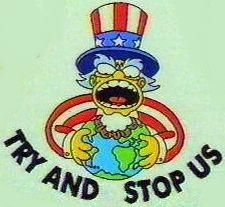Proposed Budget Would Strip TSA of Its Biggest Programs
(The Washington Post)
By Sara Kehaulani Goo, Page A06, February 09, 2005
"The Transportation Security Administration, the primary government agency entrusted with protecting travelers from terrorist attacks aboard commercial airliners, faces a large-scale dismantling under President Bush's 2006 budget proposal.
If approved by Congress, the proposal would strip the TSA of its biggest and most high-profile programs and leave it largely as a manager of 45,000 security screeners at a time when airports may now elect to replace the federal screeners with those employed by private companies.
The Bush budget calls for the Department of Homeland Security to create an office called Screening Coordination and Operations that would absorb some programs of TSA and other divisions. The office would oversee records on millions of Americans and foreigners in vast databases that contain digital fingerprints and photographs, eye scans and personal information from travelers and transportation workers. The move is meant to prevent overlap among the various programs now scattered across the department and improve efficiency.
Officials are now exploring whether "there are ways to closely coordinate and integrate these. Can they be married up?" said Homeland Security spokesman Dennis Murphy. "Are there some savings by standardizing and even merging these? We're constantly looking for those opportunities."
Homeland Security officials said the new office would combine all of the department's experts who are working on new technologies, privacy issues and databases. Government officials want to explore whether a program designed to vet the backgrounds of airline passengers, for example, would work for screening travelers using other modes of transportation.
If approved, the Screening Coordination and Operations office would include:
. Secure Flight, a proposed TSA program that would probe the backgrounds of each traveler who books an airline ticket and determine whether they should receive additional screening.
. Registered Traveler, TSA's program now being tested at Reagan National Airport and four others that allows frequent travelers to submit digital fingerprints and undergo a background check in exchange for receiving a fast pass through the airport checkpoint.
. Transportation Worker Identity Credential, a pilot TSA program that verifies the identities and backgrounds of airport workers, truck drivers and port employees and allows them access to secure areas.
. US VISIT, a program from the Customs and Border Protection division of the department that collects digital fingerprints and photographs of foreign visitors.
. International Registered Traveler, a newly announced program that would speed customs and immigration processing for some frequent international travelers who submit to a background check. It is now being tested at Amsterdam's Schiphol airport and New York's John F. Kennedy International Airport.
The consolidation of programs worries privacy activists who fear the
government is seeking to create a national surveillance system. "This confirms our worst fears that DHS will become a one-stop shop for background checks on a wide variety of Americans, ranging from airline passengers to train travelers to workers in a variety of industries," said Barry Steinhardt, director of the technology and liberty program at the American Civil Liberties Union. Steinhardt said the new office would allow the government to maintain records on tens of millions of Americans each year.
The proposal has fueled long-circulated rumors that the TSA -- which was created a year before the Department of Homeland Security and is now a part of it -- would eventually become folded into its other divisions. Homeland Security spokesman Murphy declined to comment, but noted that the administration has proposed $5.5 billion for TSA in 2006.
"Five billion [dollars] is a healthy budget for a healthy agency," said TSA spokesman Mark O. Hatfield Jr. "We will continue to deliver on our critical security mission."
TSA was once praised by Congress for serving on the front lines to protect the nation from another terrorist attack, but its public stumbles -- including its overpayment of contractors by hundreds of millions of dollars and reports that its security screeners still fail to catch guns and knives at checkpoints -- have made it a target for criticism on Capitol Hill.
Already, the Federal Air Marshal service has left TSA to join another division of Homeland Security. It also lost its science and technology division to another part of the agency. TSA officials said they are reorganizing staff responsible for rail, truck and maritime transportation.
"TSA is beginning to look like a corporate entity, not a government entity," said Stephen D. Van Beek, an airport lobbyist, noting that much of the agency's funding now comes from fees that travelers pay through airline tickets."
Oh Please let the TSA be dismantled.
By Sara Kehaulani Goo, Page A06, February 09, 2005
"The Transportation Security Administration, the primary government agency entrusted with protecting travelers from terrorist attacks aboard commercial airliners, faces a large-scale dismantling under President Bush's 2006 budget proposal.
If approved by Congress, the proposal would strip the TSA of its biggest and most high-profile programs and leave it largely as a manager of 45,000 security screeners at a time when airports may now elect to replace the federal screeners with those employed by private companies.
The Bush budget calls for the Department of Homeland Security to create an office called Screening Coordination and Operations that would absorb some programs of TSA and other divisions. The office would oversee records on millions of Americans and foreigners in vast databases that contain digital fingerprints and photographs, eye scans and personal information from travelers and transportation workers. The move is meant to prevent overlap among the various programs now scattered across the department and improve efficiency.
Officials are now exploring whether "there are ways to closely coordinate and integrate these. Can they be married up?" said Homeland Security spokesman Dennis Murphy. "Are there some savings by standardizing and even merging these? We're constantly looking for those opportunities."
Homeland Security officials said the new office would combine all of the department's experts who are working on new technologies, privacy issues and databases. Government officials want to explore whether a program designed to vet the backgrounds of airline passengers, for example, would work for screening travelers using other modes of transportation.
If approved, the Screening Coordination and Operations office would include:
. Secure Flight, a proposed TSA program that would probe the backgrounds of each traveler who books an airline ticket and determine whether they should receive additional screening.
. Registered Traveler, TSA's program now being tested at Reagan National Airport and four others that allows frequent travelers to submit digital fingerprints and undergo a background check in exchange for receiving a fast pass through the airport checkpoint.
. Transportation Worker Identity Credential, a pilot TSA program that verifies the identities and backgrounds of airport workers, truck drivers and port employees and allows them access to secure areas.
. US VISIT, a program from the Customs and Border Protection division of the department that collects digital fingerprints and photographs of foreign visitors.
. International Registered Traveler, a newly announced program that would speed customs and immigration processing for some frequent international travelers who submit to a background check. It is now being tested at Amsterdam's Schiphol airport and New York's John F. Kennedy International Airport.
The consolidation of programs worries privacy activists who fear the
government is seeking to create a national surveillance system. "This confirms our worst fears that DHS will become a one-stop shop for background checks on a wide variety of Americans, ranging from airline passengers to train travelers to workers in a variety of industries," said Barry Steinhardt, director of the technology and liberty program at the American Civil Liberties Union. Steinhardt said the new office would allow the government to maintain records on tens of millions of Americans each year.
The proposal has fueled long-circulated rumors that the TSA -- which was created a year before the Department of Homeland Security and is now a part of it -- would eventually become folded into its other divisions. Homeland Security spokesman Murphy declined to comment, but noted that the administration has proposed $5.5 billion for TSA in 2006.
"Five billion [dollars] is a healthy budget for a healthy agency," said TSA spokesman Mark O. Hatfield Jr. "We will continue to deliver on our critical security mission."
TSA was once praised by Congress for serving on the front lines to protect the nation from another terrorist attack, but its public stumbles -- including its overpayment of contractors by hundreds of millions of dollars and reports that its security screeners still fail to catch guns and knives at checkpoints -- have made it a target for criticism on Capitol Hill.
Already, the Federal Air Marshal service has left TSA to join another division of Homeland Security. It also lost its science and technology division to another part of the agency. TSA officials said they are reorganizing staff responsible for rail, truck and maritime transportation.
"TSA is beginning to look like a corporate entity, not a government entity," said Stephen D. Van Beek, an airport lobbyist, noting that much of the agency's funding now comes from fees that travelers pay through airline tickets."
Oh Please let the TSA be dismantled.



0 Comments:
Post a Comment
<< Home